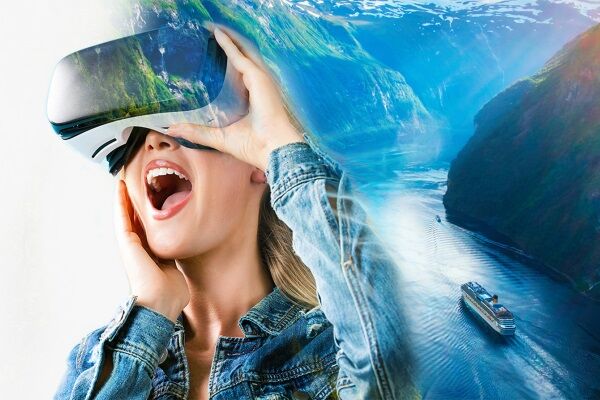No products in the cart.
Certified Virtual Reality and Augmented Reality (VR&AR) Developer (Tourism)
₹6,500.00 ₹3,250.00
50% fee concession will end in
To train professionals to develop VR and AR applications that enhance tourist experiences and promote destinations innovatively.
Description
Certification Name: Certified Virtual Reality and Augmented Reality (VR&AR) Developer (Tourism)
Global Occupational Skill Standard – GOSS ID: GOSS/HT/CVRARD/V1
Eligibility: Graduation or Equivalent or minimum 2 years of relevant experience (experience-based learners can directly enroll and certify).
Objective: The Certified Virtual Reality and Augmented Reality (VR & AR) Developer (Tourism) course is designed to equip professionals with the technical knowledge and creative skills to design, develop, and implement immersive VR and AR experiences tailored for the tourism industry. The program covers VR/AR technologies, software development, 3D modeling, user experience design, storytelling techniques, and integration of virtual environments to enhance tourist engagement.
Certification: Within 5 days after Completion of Online Assessment.
Get ready to join the Journey to become a GSDCI Certified Professional – International Certification and Assessment Body.
Steps to become a GSDCI Certified Professional:
Step 1: Select your certification you want to pursue.
Step 2: Click on get certified tab, new pop up window will open.
Step 3: Click on pay certification fee, you will be redirected to billing details page.
Step 4: Fill your details and click on pay certification fee, You will be redirected to payment gateway, pay fee by any available options like Card(Debit/Credit), Wallet, Paytm, Net banking, UPI and Google pay.
Step 5: You will get Login Credentials of Online E-Books and Online assessment link on your email id, within 48 hrs of payment.
Step 6: After completion of online assessment, you can download your Certificate Immediately.
Assessment Modules:
Module 1: Introduction to VR and AR in the Tourism Industry: Fundamentals of Virtual Reality (VR), Augmented Reality (AR), and Mixed Reality (MR), Evolution of immersive technologies in travel and tourism, Differences between VR, AR, and traditional multimedia experiences, Overview of tourism applications: virtual tours, AR navigation, cultural experiences, Role of VR/AR in enhancing traveler engagement and trip planning, Market trends, user expectations, and future potential in tourism.
Module 2: Tools, Platforms, and Development Environments: Overview of key development platforms: Unity, Unreal Engine, WebXR, Software tools for AR and VR: Vuforia, ARKit, ARCore, and Oculus SDK, Choosing the right hardware: headsets, smartphones, wearables, Understanding 3D modeling and assets integration in virtual environments, Introduction to spatial computing and immersive design workflows, Setting up development environments for cross-platform deployment.
Module 3: Designing VR and AR Experiences for Tourism: User experience (UX) and user interface (UI) principles for immersive content, Storyboarding and scripting for virtual storytelling in tourism, Designing interactive 360-degree tours and simulations, Incorporating soundscapes, narration, and cultural storytelling, Creating AR-enhanced guidebooks, maps, and landmark visualizations, Accessibility and inclusivity in experience design.
Module 4: Content Development and Integration Techniques: Capturing 360° images and videos using VR cameras and drones, Using photogrammetry and LiDAR for creating realistic 3D models, Integrating geolocation and mapping data with AR applications, Developing virtual museums, historical site walkthroughs, and hotel previews, Embedding real-time language translation and voice assistance, Deploying content to web, mobile, and VR/AR devices.
Module 5: Implementation, Testing, and Optimization: Cross-platform deployment considerations: iOS, Android, Oculus, and WebAR, Performance optimization techniques for immersive applications, User testing strategies and gathering feedback for iteration, Addressing motion sickness, load times, and hardware limitations, Integrating analytics and behavior tracking in VR/AR content, Case studies of successful immersive tourism applications.
Module 6: Business Models, Marketing, and Future Trends: Revenue models for VR/AR tourism applications: freemium, licensing, partnerships, Promoting VR/AR tourism apps through social media and travel platforms, Collaborating with tour operators, museums, and heritage sites, Legal and ethical considerations: copyright, privacy, content accuracy, Emerging trends: metaverse tourism, virtual travel agents, gamification, Career opportunities and entrepreneurship in immersive tourism experiences.
GSDCI Online Assessment Detail:
- Duration- 60 minutes.
- Number of Questions- 30.
- Number of Questions from each module: 5.
- Language: English.
- Exam Type: Multiple Choice Questions.
- Maximum Marks- 100, Passing Marks- 50%.
- There is no negative marking in any module.
| Marking System: | |||
| S.No. | No. of Questions | Marks Each Question | Total Marks |
| 1 | 10 | 5 | 50 |
| 2 | 5 | 4 | 20 |
| 3 | 5 | 3 | 15 |
| 4 | 5 | 2 | 10 |
| 5 | 5 | 1 | 5 |
| 30 | 100 | ||
| How Students will be Graded: | |||
| S.No. | Marks | Grade | |
| 1 | 91-100 | O (Outstanding) | |
| 2 | 81-90 | A+ (Excellent) | |
| 3 | 71-80 | A (Very Good) | |
| 4 | 61-70 | B (Good) | |
| 5 | 50-60 | P (Pass) | |
| 6 | 0-49 | F (Fail) | |
Benefits of Certification:
🌍 1. Global Recognition & Credibility – Stand out worldwide with a certification that opens doors across borders. Trusted by employers, respected by institutions, and recognized in over 100 countries.
📜 2. Quality Assurance through ISO Certification – Certified to global ISO standards, our programs deliver excellence, consistency, and a benchmarked learning experience that speaks for itself.
💼 3. Career Advancement & Employability – Enhances your resume and increases chances of promotions or job offers.
🤝 4. Non-Profit Trust Factor – Certifications from non-profit organizations are mission-driven rather than profit-driven.
📚 5. Access to Verified Learning & Resources – Often includes e-books, mock tests, and online support without hidden costs.
🔍 6. Transparency & Online Verification – Certifications come with a unique Enrolment ID for easy online verification by employers and institutions.
⏳ 7. Lifetime or Long-Term Validity – Certifications usually have lifetime validity or long-term recognition, reducing the need for frequent renewals.
